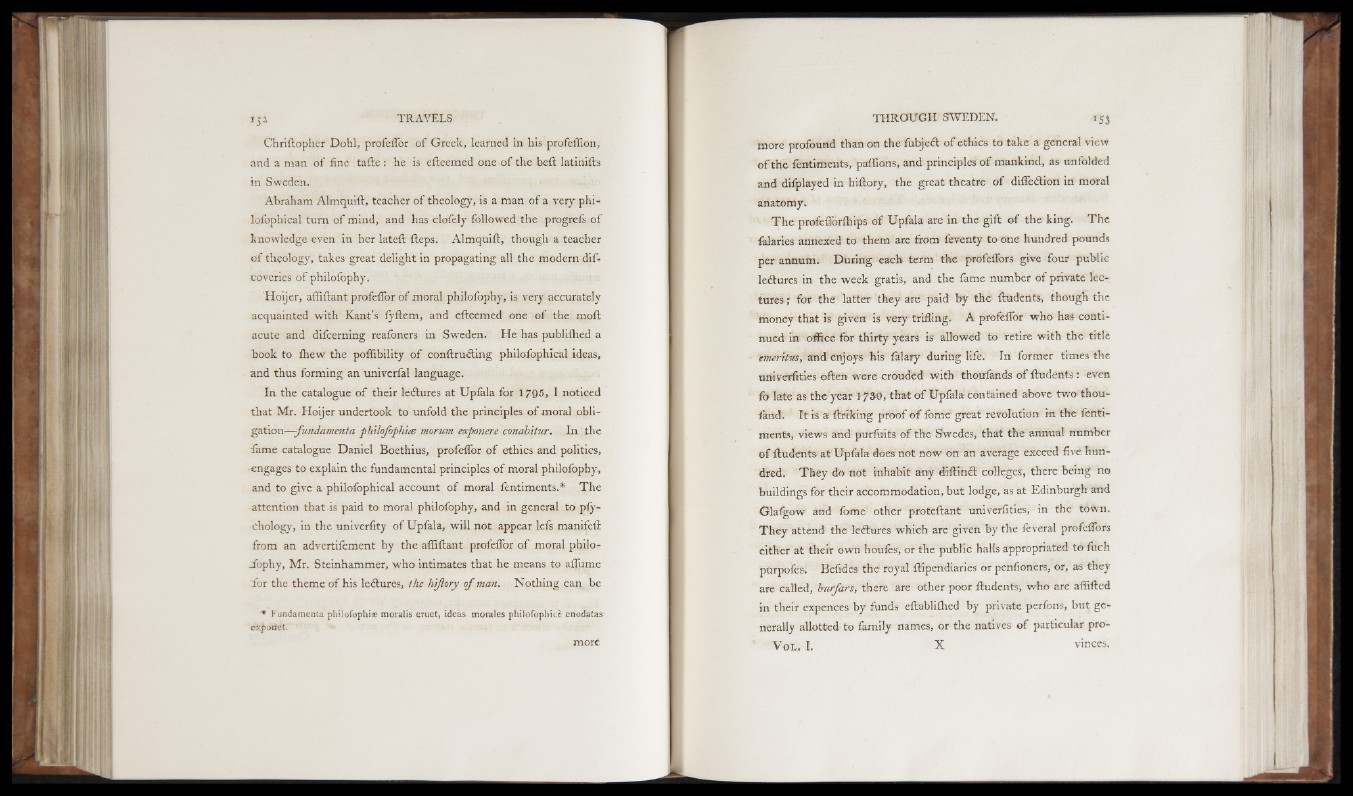
Chriilopher Dohl, profeffor o f Greek, learned In his profeffion,
and a man o f fine tafte : he is efteemed one o f the bell: latinifts
in Sweden.
Abraham Almquift, teacher o f theology, is a man o f a very phi-
lolophical turn o f mind, and has clofely followed the progrefs o f
knowledge even in her lateft fteps. Almquift, though a teacher
o f theology, takes great delight in propagating all the modern dif-
coveries o f philolbphy.
Hoijer, affiilant profeflor of moral philolbphy, is very accurately
acquainted with Kant’s iyftem, and efteemed one o f the. mod
acute and difceming reafoners in Sweden. He has publilhed a
book to fhew the poffibility o f conftruíling philolbphical ideas,
and thus forming an univerfal language.
In the catalogue o f their leisures at Upfala for 1 795, 1 noticed
that Mr. Hoijer undertook to unfold the principles o f moral obligation—
fundamenta phtlofophice morum exponere conab'itur. In the
dame catalogue Daniel Boethius, profeffor o f ethics and politics,
•engages to explain the fundamental principles o f moral philolbphy,
and to give a philofophical account o f moral fentiments.* The
attention that is paid to moral philofophy, and in general to ply-
chology, in the univerfity o f Upfala, will not appear lefs manifeft
from an advertifement by the affiilant profeffor o f moral philo-
jfophy, Mr. Steinhammer, who intimates that he means to affume
for the theme o f his leétures, the hiflory o f man. Nothing can. be
* Fundamenta philofophiae moralis eruet, ideas morales philofophicé enodatas
cxl>oo'et.
morí
more profound than on the fubjedl o f ethics to take a general view
o f the ientiments, paffions, and principles o f mankind, as unfolded
and difplayed in hillory, the great theatre o f diffefiion in moral
anatomy.
T h e profefforlhips o f Upfala are in the gift o f the king. The
falaries annexed to them are from feventy to One hundred pounds
per annum. During each term the profeffors give four public
ledlures in the week gratis, and the fame number o f private lectures;
1 for the latter they are paid by the Undents, though the
money that is given is very trifling. A profeffor who has continued
in office for thirty years is allowed to retire with the title
etnerkws, and enjoys his falary during life. In former times the
univerfities often were crouded with thoufands o f ftudents: even
fo late as the year 1730, that o f Upfala contained above two thou-
fand. It is a ftrrking proof o f Ibnre' great revolution in the fentiments,
views and purluits o f the Swedes, that the annual number
o f ftudents at Upfala does not now on an average exceed five hundred.
T he y do not inhabit any difttndl colleges, there being no
buildings for their accommodation, but lodge, as at Edinburgh and
Glafgow and lome other profeftant univerfities, in the town.
T h e y attend the leilures which are given by the feveral profeffors
either at their own houles, or the public halls appropriated to fuch
ptirpofes. Befides the royal ftipendiaries or penfioners, or, as they
are called, hurfars, there are other poor ftudents, who are affifted
in their expences by funds eftabliffied by private perfons, but generally
allotted to family names, or the natives o f particular pro-
V g l . I. X vinces.